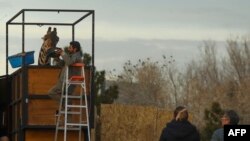A giraffe named Benito started a 40-hour road trip Monday to leave behind the cold and loneliness of Mexico's northern border city of Ciudad Juarez to find warmth — and maybe a mate — in his new home 2,000 kilometers (1,200 miles) to the south.
A campaign by animal rights activists won the 4-year-old giraffe a transfer to an animal park in Puebla state in central Mexico, where he will join a group of resident giraffes and enjoy a more suitable climate.
It has been a long and lonesome road for Benito. Jealousy forced him to leave his home at a zoo in the Pacific coast state of Sinaloa; he was taken last year to a city-run park in Ciudad Juarez, across from El Paso, Texas to lead a life alone.
With temperatures in Ciudad Juarez reaching as low as 4 degrees C (39 degrees F) Monday, Benito set off in a crate strapped to the back of a flat-bed truck. He is a tall load, about 5 meters (more than 16 feet) high, and the roof of his crate can be lowered to pass under bridges.
The animal's head sticks up through the top of the big wooden and metal box, but a frame allows a tarp to go over Benito and insulate him from the cold, wind and rain as well as from noise and the sight of landscape speeding by.
Residents gathered to say goodbye late Sunday in Ciudad Juarez as a crane lifted the container holding the giraffe onto the truck in preparation for the journey. "We love you, Benito," some of them shouted.
"We're a little sad that he's leaving. but it also gives us great pleasure ... The weather conditions are not suitable for him," said Flor Ortega, a 23-year-old who said she had spent her entire life visiting Modesto, another giraffe who was at the zoo for two decades before dying in 2022. Benito arrived last May.
Benito is being transported across Mexico to Africam Safari park in central Puebla state where the low temperatures are about 20 degrees F warmer than in Ciudad Juarez.
More importantly, Benito may finally find a mate: There will be three female giraffes at his new home.
Environmental groups had voiced strong complaints about conditions faced by Benito at the city-run Central Park zoo in Ciudad Juarez, where weather in the summer is brutally hot and temperatures plunge during the winter.
Benito originally came from a zoo in the much more temperate climate of Sinaloa, a state on Mexico's northern Pacific coast. Benito couldn't stay with the two other giraffes there because they were a couple, and zookeepers feared the male would become territorial and attack the younger Benito.
So he was donated to Ciudad Juarez. In the summer there, he had little shade in his 0.2 hectare (half-acre) enclosure; photos showed him crouching to fit under a small, circular shade canopy in the summer. In the winter, ice sometimes formed in the enclosure's pond. There were few trees for him to munch on.
At the Africam Safari park, the giraffes live in a much larger space that more closely resembles their natural habitat. Visitors travel through the park in all-terrain vehicles to observe animals as if they were on safari.
The giraffe was allowed to become familiar with his transport container during the weekend, said Frank Carlos Camacho, the director of the Africam Safari park.
In a video update posted Monday afternoon from the north-central state of Zacatecas, about 15 or 16 hours into the trip, Camacho said "Benito is doing very, very well."
He said the truck had stopped for park personnel to check the cables holding the box, and to give Benito "some treats, a little sugar to give him energy."
The voyage is going faster than originally predicted, in part because the truck carrying Benito doesn't need to go especially slow.
Inside the container is straw, alfalfa, water and vegetables, and electronic equipment monitors the temperature and even allows technicians to talk to the animal.
Outside, Benito is being escorted by a convoy of police, environmental officials and the National Guard.
At his new home, it will be almost like life will begin again for him, Camacho said. "He's ready to be a giraffe," he said. "He will reproduce soon and contribute to the conservation of this wonderful species."





